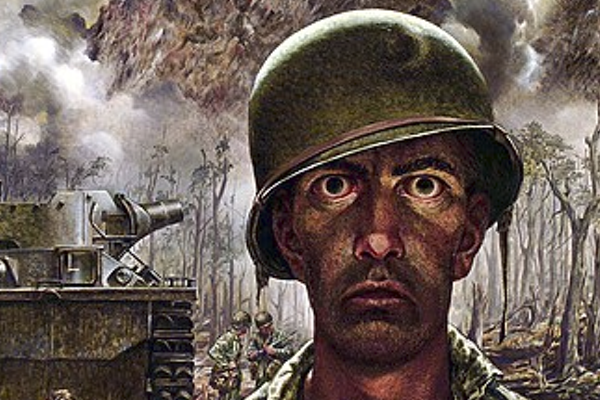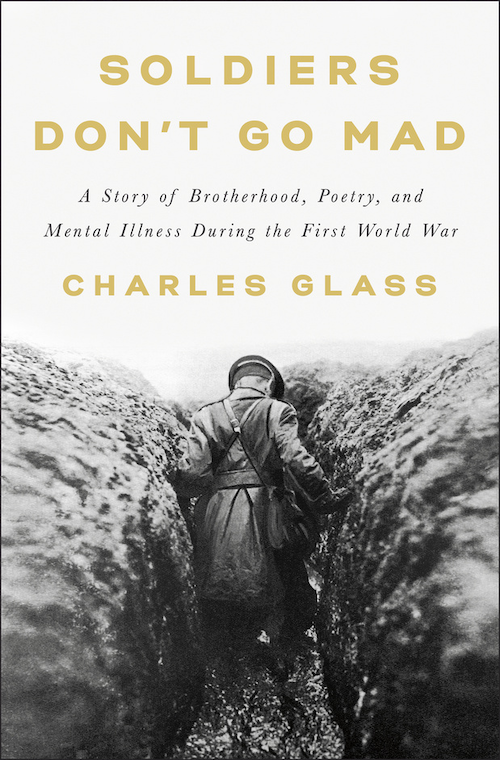From "Shell Shock" to PTSD, Veterans Have a Long Walk to Health

"The 2000 Yard Stare", by Thomas Lea, 1944, WWII. The Army Art Collection, U.S. Army Center for Military History
Will Robinson, an American Iraq war veteran, languished for months with depression and post-traumatic stress disorder (PTSD) all alone at home in Louisiana. One day in March 2016, he watched the movie “Wild,” starring Reese Witherspoon as Cheryl Strayed. Strayed’s book of the same title told of her redemption from despair by hiking 2,650 miles of wilderness on the Pacific Coast Trail, from Mexico to Canada. Robinson decided to follow Strayed’s example, packing up a tent and supplies a month later to duplicate her journey and, he hoped, its hopeful outcome.
He had nothing to lose. Forced into the army at the age of eighteen by a judge who promised to erase his conviction for petty theft if he served, he was deployed to South Korea in 2001 and Iraq in 2003. Six months in Iraq left him with injuries to his wrist, his knee and, more significantly, his mind. The army gave him a medical discharge for PTSD, but it offered little in the way of medical treatment. He attempted suicide with drugs the Veterans Administration issued him, surviving only because the pills made him vomit. Other vets of the war on terror were not so lucky; every day, an average of twenty-two take their lives rather than endure another moment of living hell. Robinson promised his mother he would not try again. Then she died, and he retreated into loneliness and depression.
It was during that dark time that Robinson saw “Wild” and took his first, literal, step towards recovery. He may not have known that he was following the advice of a British psychiatrist, Dr. Arthur J. Brock, who had prescribed similar solutions to soldiers traumatized in the First World War. The battles between 1914 and 1918 subjected young men to the unprecedented terrors of high explosive artillery shells, poison gas, flamethrowers, rapid machine-gun fire and claustrophobia in rat-infested trenches. Growing numbers of casualties carried to field hospitals had no physical wounds. At least, not wounds the doctors could see.
The soldiers suffered nervous breakdowns. They called their malady “shell shock,” a term introduced to the medical lexicon by psychiatrist Dr. Charles Samuel Myers after he visited the front in 1915. A high proportion of the victims were junior officers, who shared the troops’ fears but also led them in futile offensives against relentless enemy fire and felt a burden of guilt for their deaths. The military needed these officers, but the war had transformed them into paralysed, trembling, stuttering, blind or deaf wrecks unable to fight or to lead.
The British government was forced to open hospitals to aid them and, more importantly, make them fit to return to battle. Dr. Brock took up his post at Scotland’s Craiglockhart War Hospital for Officers when it opened in October 1916. His belief, based on his pre-war practice with mental breakdowns, was that “the essential thing for the patient to do is to help himself,” and the doctor’s only role “is to help him to help himself.” Brock blamed modern society as much as industrial warfare for severing people from the natural world and from one another, resulting in an epidemic of mental illness. His treatment for the soldiers was the same as it had been for civilians who broke down amid the struggle for survival in harsh economic times: reconnect to the world, especially the natural world. He encouraged his patients, including the poet Wilfred Owen, to explore the wild Pentland Hills near Craiglockhart. Many joined Frock’s Field Club to study nature and restore their pre-war relationship to it.
Symbolizing his method was a drawing on his consulting room wall. It depicted the mythological wrestling match between the hero Hercules and the giant Antaeus of Libya. Antaeus, son of the earth goddess Gaia, drew his strength from his mother earth as Samson did from his hair. As long as he was touching the ground, his strength was prodigious. Realizing this, Hercules lifted Antaeus into the air and broke his back. “Antaeus is civilisation,” Brock wrote, “and Hercules is the Machine, which is on the point of crushing it.” The war machine had crushed his patients’ minds. Some of them in fact had been hurled skywards and rendered unconscious by exploding shells. Brock urged them to find peace through nature.
Will Robinson made his connection to mother earth by trekking and sleeping rough on the Pacific Coast Trail, and later on other famous routes –the Tahoe Rim, the Arizona, the Ozark Highlands, the Continental Divide, and the Appalachian. He clocked over 11,000 miles, the first African American man to do so. ESPN declared him “the trailblazing superstar of thru-hiking.” Not only did he come to understand and survive wild environments, he discovered something his life was lacking: community. “Thru-hiking has that community, and it’s why I love it so much,” Robinson told ESPN journalist Matt Gallagher. “People need to know they belong to something.”
Brock would have approved. Connecting to others, becoming part of a community, was as vital to mental health as relating to the earth. Robinson made friends on his treks and mentored younger hikers, including other veterans. He also met the woman who became his girlfriend, and they continue to wander America’s rural byways together. Robinson worked hard to traverse those miles and overcome his war demons. For other American vets, as for World War I’s shell-shocked warriors, there is no single cure for PTSD. What works for one will fail another. Robinson found his way, and it is up to the government that sent them to war to find ways for the rest to resume their lives.
Modern American veterans have one advantage over Brock’s charges. The men whom Brock aided to health had to return to the trenches. Many broke down again or were buried in what war poet Rupert Brook called “some corner of a foreign field/That is forever England.”

© Charles Glass 2023